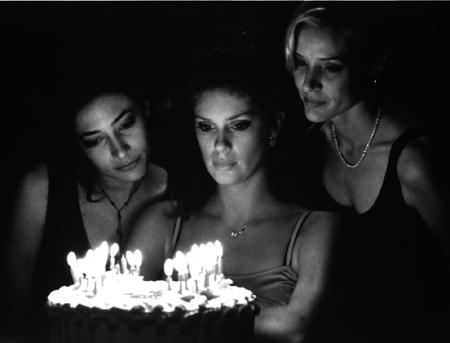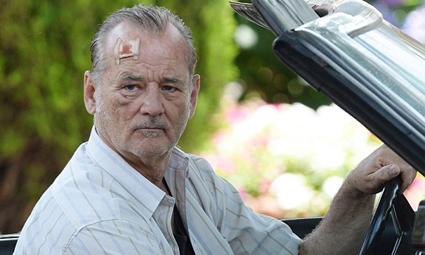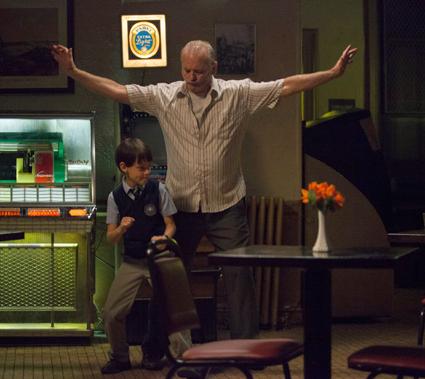

“Happy Delusion:” An Interview with Theodore Melfi, Writer/Director of ST. VINCENT
October 9th, 2014
I’ve known Ted Melfi for a while. But for most people he is one of those 10 years in the making overnight success stories that writers need to hear about. Ted didn’t write a couple of scripts, send them out, sell one, and magically appear on stage with Bill Murray on opening night of his movie. He struggled and toiled for many years. Yet, he might actually dispute the word “toiled” as he has an infectious positivity – what he calls his “Happy Delusion.” Those who know him say Ted is someone you want to work with, almost have to work with because there is something about him that seems, well, Normal. Real. And apparently in Hollywood, that is unusual! Go figure.
Ted is an experienced “first timer” having produced, written and directed a bunch of short films, commercials, and oh by the way, a movie (WINDING ROADS) back in the day. He has been perfecting his craft for over two decades and just now is getting the recognition he deserves. The lesson, Ted would say, “Keep working at it! Be delusional in your impending success. No matter what!”
Not only does Mr. Melfi have ST. VINCENT coming out (10.10.14) he has big things in development including the Martin Brest classic GOING IN STYLE for New Line Cinema, an adaptation of the J.R. Moehringer memoir THE TENDER BAR for Sony Pictures and Chernin Entertainment, as well as other projects that haven’t even been officially announced yet.
So look for more films from Ted Melfi in the near future as he enjoys his “Happy Delusion.”
ST. VINCENT stars Bill Murray, along with co-stars Melissa McCarthy, Naomi Watts, Chris O’Dowd and others. Check out the trailer below, enjoy the interview, and go see the movie!
Ted, are you really a member of Van Nuy's Elk Lodge #2790 just because they have cheap beer?
I think the price of beer in this country has become despicable. In New York some beers are nine dollars. Even crap beer is six dollars. What is this world coming to!? [laughs]. But the Elks lodge in Van Nuys still has $2 beers. And you know what, they’re still making a profit. And, even more importantly, they’re raising millions of dollars for handicapped children in California. So if that’s not a win-win, what is?
You're one of those 10-15 years in the making overnight success stories, but you're not a "first time" director, you wrote, produced, and directed WINDING ROADS starring Kimberly Quinn, Adam Scott and Rachel Hunter. Yet, you are a first timer in a lot of ways.
 Yes the “overnight success” phrase is the industry’s way of saying, “we don’t know who the fuck you are, so we’re going to give you a tag.” I directed WINDING ROADS – my first full length film co-wrote it with my wife (Kimberly Quinn) and it premiered on Showtime many years ago. So, I guess since it wasn’t a theatrical feature I am technically a first time “theatrical feature director.” So fair enough. I’ve also produced nine independent movies of all shapes and sizes. Produced, wrote and directed several short films and directed a gazillion television commercials. Along the way I’ve also shot several Mexican music videos and I don’t speak a lick of Spanish beyond “hola.” I’m fine with the “first time director” label, whatever it took to get the film made.
Yes the “overnight success” phrase is the industry’s way of saying, “we don’t know who the fuck you are, so we’re going to give you a tag.” I directed WINDING ROADS – my first full length film co-wrote it with my wife (Kimberly Quinn) and it premiered on Showtime many years ago. So, I guess since it wasn’t a theatrical feature I am technically a first time “theatrical feature director.” So fair enough. I’ve also produced nine independent movies of all shapes and sizes. Produced, wrote and directed several short films and directed a gazillion television commercials. Along the way I’ve also shot several Mexican music videos and I don’t speak a lick of Spanish beyond “hola.” I’m fine with the “first time director” label, whatever it took to get the film made.
You moved to LA back in the 1990s, worked in a restaurant?
I moved out to LA after the big earthquake in 1994. The rent was real cheap then [laughs]. I wanted to be a writer so naturally I ended up being a cook at a tiny Italian cafe in Studio City during the day. And to make ends meet I was also a security guard at a strip club in the Valley at night; expect I was in the parking lot, watching cars. So unfortunately, there weren’t any fringe benefits.
You toiled for a lot of years directing commercials and plugging away writing screenplays that didn't necessarily get you anywhere. What did that experience teach you?
Write until you bleed. I have a dozen screenplays in a drawer, a dozen in various stages of development, and another dozen or so ideas spinning around my head. I write all the time. I write treatments for commercials and scripts and shorts and long-winded emails. The point is I write all the time, it’s a muscle and if you are not exercising it, atrophy sets in. You have to know it takes time to find your voice and your voice changes over time. The time you put into your writing will pay off. Barrel forward and believe. You have to be delusional to get anywhere.
You have written and directed some excellent (and award winning) short films such as "Roshambo" and "I Want Candy." How has that informed or helped you as a screenwriter?
Short films and commercials have been my training ground and my gym. They have showed me what works and what doesn’t work. So all that work has informed ALL of my writing throughout the years. Screenwriting can be lonely and hard and laborious. Being able to practice and have a sense of what is going to work saves you a tremendous amount of time and energy. I am forever grateful for my short film work. I’d be nowhere without it.
Your script ST. VINCENT DE VAN NUYS makes The Black List in 2011, what happened after that that made you think, "huh, maybe this could be something”?
At first nothing. I didn’t even know what the Black List was; and I’m not being coy. I thought the Black List was a bad thing; from my historical knowledge at least. I was going to make this film no matter what because that’s the promise I made to myself. And my wife (Kimberly Quinn) helped me develop the script; she pushed, prodded and encourage me in my happy delusion. That’s what we call my persistence: Happy Delusion. I believe to a fault. Two friends of mine were going to invest 800K in the film and we were going to make the film. But then my agents got the script out to a few people and Jenno Topping read it and passed it along to Peter Chernin and in a few weeks we went from making a no-budget movie to a studio film.
 So you reach out to Bill Murray, who is incredibly hard to reach, and eventually he reads the script and contacts you.
So you reach out to Bill Murray, who is incredibly hard to reach, and eventually he reads the script and contacts you.
Yeah. So I’m driving one day and the phone rings and it’s Bill Murray and he says, ‘Ted Melfi, I don’t know who you are, but I love your script.’ He asked me to meet him at LAX and go for a ride; he was returning home from a golf tournament. I met him in baggage and we got in a Town Car. He pulls the script out and it’s dog-eared and there are notes all over it. We stop at an In-N-Out Burger and then spend the next three hours driving to I don’t know where and the entire time we are discussing the script. He understood everything about the character, and he had lots of notes that were direct and to the point. And at one point he said to me, ‘This character is who I am at times, and this is how I talk at times.’ It was one of those days where, If I died tomorrow, it would be OK.
What was the inspiration for ST. VINCENT?
It’s based on a couple of true stories. First, my brother (Phil) passed away tragically eight years ago and my wife and I adopted his eleven year old daughter. So anyway, we ended up placing her in a Catholic School where she was given a homework assignment to write about a Saint that she liked, she picked St. William of Rochester; the patron saint of adopted children. She also picked me and that’s when it hit me, that’s a story that I want to tell. Second, it's also based on my wife’s father who was a Vietnam vet, but was an asshole most of his life; he was a drunk, gambler, and pretty much abandoned her when she was young (nine years old). Long story short, twenty-five years later my wife writes him a letter saying she wanted the chance to get to know him. He calls and they reunite enjoying the final 10 years of his life. He became a saint for her.
What happened to the "Van Nuys" part of the script?
 Harvey Weinstein said we couldn’t shoot in LA because we needed a tax incentive to make the budget work and the tax incentive was in New York; and obviously Van Nuys is in California. And so a title dies. But the truth is, I was born and raised in New York and Brooklyn and shooting there was a dream come true. It actually ended up being way more suited for the film than Van Nuys would have ever been.
Harvey Weinstein said we couldn’t shoot in LA because we needed a tax incentive to make the budget work and the tax incentive was in New York; and obviously Van Nuys is in California. And so a title dies. But the truth is, I was born and raised in New York and Brooklyn and shooting there was a dream come true. It actually ended up being way more suited for the film than Van Nuys would have ever been.
You also wrote a script that made the 2010 Hit List, I AM ROSE FATOU about two ne’re-do-well lovers that meet in a phishing scheme. Was that when you really started to gain confidence as a writer?
I love that script and hope to make it one day, but again I had never heard of the Hit List before and in Brooklyn growing up that phrase meant something entirely different. I started gaining confidence as a writer when I was very young. I actually wrote for my dad’s newspaper for ten years, I had my own column. Even back then everyone said I should be a writer. So I had a sense at an early age that I enjoyed writing and I had some ability. The next big moment for me was in college when a Psychology professor wrote a note to me on one of my papers. I’ll never forget what she wrote, “You should never stop writing.” That was so wonderful and inspiring. It really allowed me to think I could do it.
Recently you've penned the remake of the Martin Brest classic "Going in Style" for New Line Cinema, you also adapted the NY Times bestselling memoir "The Tender Bar," can you share the status of either of those scripts/projects?
“Going in Style” is in the casting process, it’s tricky to get the right cast and it’s such a classic movie that it has to be done just right. “The Tender Bar” is such a wonderful piece of work and I really want to get that made. It’s around town right now with finance people.
What's your process when you approach a spec script?
I don’t really have a specific approach other than some idea will move or inspire me and it becomes a sort of virus in my mind that I can’t let go of. Then it festers and grows until I have to spit it out. With ST. VINCENT the death of my brother and the adopting of his daughter was the inspiration that guided me and I couldn’t shake it. With ROSE FATOU it was a phishing email that I got and I started a relationship with this phishing scammer – essentially to fuck with them and that led to the script. Inspiration comes from everything – so I try to stay open and focused because the truth is, I can see a movie in damn near anything and most of them should not be made!
Are you a director or writer first and foremost and why? How do the two play off and inform the other?
First and foremost I am a writer. I’ve been doing it since I was eight and it’s my first love. I love writing stories and dialogue and imagining characters and scenes and shots. I came into directing because I wanted to see the things I wrote get made and I love it as much as writing these days. It’s such a collaborative experience and I love working with people and creating a world you can disappear in. To me writing and directing are opposite sides of the same coin. They co-exist and have to co-exist. I would not be any kind of writer without knowing how to direct and vice-versa. They are intertwined. When you write you toil and sweat on a page – you live the lives of your characters and you inhabit them and they inhabit you. That's why as a writer when you direct the first thing you do is detach yourself from the script, to figuratively throw it away. The reason being if you hold onto the words you will die and the film will die. So these two need each other, but they have to divorce from each other in order to find success. In the end, they get back together and a film is born.
Where do you see yourself in ten years professionally?
I don’t know really. I just want to be able to tell stories and to touch and inspire people. I want to be happy and enjoy my family, my wife and daughters. This process of making ST. VINCENT has been the most rewarding and challenging professional journey of my life. If in ten years people are still talking about the movie, then it was all worth it. It hit the mark and had value or made a difference in people’s lives. That’s what I want out of my professional life. And however that happens: film, tv, commercials, even writing a damn novel…it’s fine with me.
About the Author
Take Chris' Class: Writing Screenplays Hollywood Wants. 12 tutorials, downloads, materials, 1.5 hours of video instruction, and a weekly interactive video Q & A. All for just $19.95!
(Follow on Twitter) Christopher Wehner is a published author and produced screenwriter, EL CAMINO CHRISTMAS @Netflix and AMERICAN DREAMER (later this year); visit his IMDB page for future projects. Christopher has been a leading member of the online screenwriter's community going back to the 1990s. In 2001 he published the groundbreaking book Screenwriting on the Internet: Researching, Writing and Selling Your Script on the Web,.
To contact Chris visit his website: Warm Beer Productions.
More recent articles in Interviews
Only logged-in members can comment. You can log in or join today for free!
Advertisement








